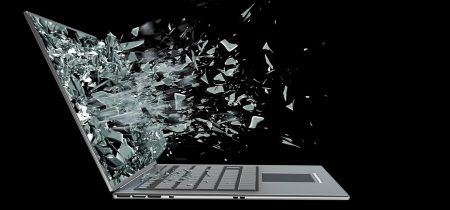Laptop computers are more portable than desktop computers and can offer specifications that are comparable to those of entry-level desktops. Even if you are in the market for a laptop, you should take a look at our best computer article because it also covers hardware specifications and explains what they all mean. All of that information is going to be applicable to laptops as well.
This overview of the best laptops for podcasting is intended to assist you in evaluating your available choices before you commit to making a purchase.
Top Laptops for Podcasting
If you are a podcaster, you need a laptop that can handle audio recording and editing tasks. Here are some of the best laptops for podcasting based on their features and user reviews:
MacBook Pro 16-inch
The MacBook Pro 16-inch is a popular choice among podcasters because of its powerful processor and large storage capacity. Its Retina display also provides clear and crisp visuals.
Dell XPS 13
The Dell XPS 13 is a lightweight laptop that offers excellent audio quality and long battery life, making it ideal for podcasters who are always on the go. It also has a stunning display with minimal bezels for an immersive viewing experience.
ASUS ZenBook UX425
The ASUS ZenBook UX425 is a budget-friendly option that doesn’t skimp on performance. Its 11th Gen Intel Core processor and long battery life make it a reliable choice for podcasters who need to record and edit audio for hours on end.
HP Spectre x360
The HP Spectre x360 is a versatile 2-in-1 laptop that can convert into a tablet, making it convenient for podcasters who want to record on the go. It also has a fast processor and ample storage space for audio files.
Lenovo ThinkPad X1 Carbon
The Lenovo ThinkPad X1 Carbon is a durable laptop that can withstand frequent travel and heavy use. Its long battery life and powerful processor make it a great choice for podcasters who need a reliable laptop for recording and editing audio.
Acer Swift 5
The Acer Swift 5 is a lightweight laptop that offers excellent audio quality and a long battery life. It also has a bright and vibrant display, making it easy to edit and produce high-quality audio content.
Microsoft Surface Laptop 3
The Microsoft Surface Laptop 3 is a sleek and stylish laptop that offers powerful performance and long battery life. Its touchscreen display and versatile design make it a great choice for podcasters who want to edit audio on the go.
When choosing a laptop for podcasting, consider the specs that are important for audio recording and editing, such as the processor, RAM, and storage capacity. It’s also important to choose a laptop with a high-quality microphone and speakers, as well as a comfortable keyboard for long recording and editing sessions.
What Should I Look for in A Laptop If I Want to Create Podcasts?
It doesn’t really matter what brand it is. What really matters is what’s going on behind the scenes. A quad processor with a base speed of 2.6 gigahertz and at least 8 gigabytes of random access memory are the bare minimum specifications that come highly recommended from me.
The term “bloatware” refers to preinstalled software that is exclusive to the company from which you purchase the laptop. Some of them fulfill a n important or helpful function, while others don’t. To a certain extent, pre-built computers have this, while custom-built computers have a minimal amount.
Can You Use a Laptop for Podcasting?
Yes, you could say that this is a good option. You always have the option to purchase a gaming laptop if you do not wish to customize the specifications of your own laptop. Even though it’s not required in any way, doing so means you won’t have to worry about performance issues related to podcasting even when the system is under a heavier processing load.
These machines were designed to perform extremely quickly, and the vast majority of them now come equipped with SSDs (solid state drive – i.e. a super-quick hard drive). The performance of a laptop can be significantly improved by installing an SSD. These are a little bit more expensive than the others. Budget-friendly gaming laptops still start at around $800.
Upgrading A Laptop for Podcasting Purposes
Sometimes you can upgrade parts in a laptop. In this step, you might decide to purchase a less expensive model and then replace certain components with others.
If you choose to proceed in this manner, you will need to ensure that the central processing unit (CPU) is of a high quality because the CPU is one component that is typically unable to be replaced. Keep in mind that you should look for at least four cores running at 2.6 GHz.
Switching from an HDD to an SSD can be cheaper (I did it recently for $100), and RAM can sometimes be changed. Before tinkering with the RAM, I would first put in an SSD to see how much of an improvement it would make in the machine’s performance. This is a personal preference of mine.
Is Surface Pro 7 Good for Podcasting?
The Microsoft Surface Pro is a good choice for a laptop when it comes to recording podcasts. This piece of hardware features an up-to-date and powerful processor manufactured by Intel.
This laptop has a wonderful display, but the USB-C port that is built right in is by far its most impressive feature. The laptop has a straightforward design, and there are no color customization options available.
Take a look at the most recent model of the Surface Pro 7 if you have an interest in color schemes.
Pros
- Long-lasting battery
- Superior screen quality
- Good kickstand
- USB-C port
Cons
- Keyboard not included
- Issues with SSD performance
Frequently Asked Questions
Is A Chromebook Good For Podcasting?
It is dependent on the requirements that you have as a podcaster. It’s an excellent choice if you want to record and listen to podcasts on your Chromebook, which is one of its many uses. If you need to edit the episodes of your podcast, you should consider purchasing a different laptop that runs Windows or MacOS.
What Makes Chromebooks Best For Podcast Listening And Recording?
Due to a number of factors, Chromebooks are ideally suited for recording, listening to, and podcasting. To begin, the battery life of Chromebooks is typically very impressive. When it comes to podcasting, this is an important consideration because it’s likely that you’ll be doing a lot of listening and recording on the move. On a Chromebook, you should typically be able to get somewhere between 8 and 10 hours of battery life out of it.
How Much RAM Do I Need for Podcast?
you will need a minimum of 8 GB of RAM. However, once you are inside, you will require a greater quantity of RAM, specifically 16 GB.
What Are The Key Differences Between A Desktop Computer And A Laptop For Podcasting?
There are components that are exclusive to laptops, such as trackpads, batteries, keyboards that are built in, and manual controls for additional fans (more on gaming laptops). In addition to the functionality of the operating system itself, each feature that is required for the laptop to function consumes a portion of the limited resources. This includes the functionality of WiFi and Bluetooth, which consumes resources even before additional software is installed.
Conclusion
Because there are so many different laptop models available, I am unable to make a comprehensive recommendation regarding which one is best for podcasting. I have a preference for MSI products because I have used them for many years; in fact, the laptop I am using right now is six years old and was purchased from MSI before I needed to upgrade any of its components.
With the information provided in this article, you should be in a better position to make a decision about which path you can take based on the requirements that are unique to you as well as the resources that are available to you.













